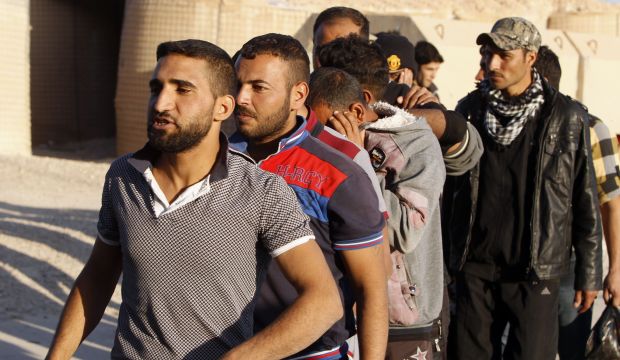
Sunni volunteers stand in line to join the Iraqi army to fight against ISIS, at the Ain Al-Assad military base in Anbar province, on November 11, 2014. (Reuters/Ahmed Saad)
Anbar, Asharq Al-Awsat—A delegation from Iraq’s western Anbar governorate, large parts of which remain under the control of the Islamic State of Iraq and Syria (ISIS), is preparing to visit Washington to call for more security and humanitarian assistance, the head of Anbar’s Provincial Council Sabah Karhout told Asharq Al-Awsat.
The high-level delegation will be headed by Anbar Governor Suhaib Al-Rawi and will include a number of senior local officials. The delegation will meet with US officials and is set to call for Washington to provide more assistance to Anbar’s Sunni tribes, including the provision of arms, military equipment and training of tribal fighters who are battling ISIS.
While the US-led anti-ISIS coalition has carried out airstrikes on ISIS targets across Iraq, few airstrikes have targeted ISIS positions in Anbar, Iraq’s western-most province. Provincial capital Ramadi remains in the grip of ISIS, as do large parts of Fallujah.
Bordering ISIS-held territory in Syria, central and western parts of Anbar remain under ISIS control despite local tribal forces seeking to push the jihadist group back across the border. Given the governorate’s position, observers believe that any military offensive to liberate ISIS-held territory in Anbar must come as part of a second phase of military action following the liberation of territory in more central parts of Iraq. However Anbar residents warn that they are facing a humanitarian crisis under ISIS, calling for the international community to do more.
Karhout informed Asharq Al-Awsat that the tribal delegation will provide an in-depth report about the humanitarian situation in Anbar’s ISIS-held territory to convince Washington to provide the required aid.
The Anbar council chief called on local media to provide documentation, particularly images and video, of life under ISIS, as well as evidence of ISIS destruction of homes and government infrastructure. He also called on local residents to provide witness testimony of ISIS crimes and massacres.
The planned visit to Washington comes following reports that residents in ISIS-held territory in Anbar are suffering from an acute lack of medicine and food.
Spokesman for the Anbar governor, Basem Al-Anbari, told Asharq Al-Awsat: “2014 has been the year of setback for Anbar after extremists and foreign fighters took control of Anbar’s brave and noble cities. Unfortunately, these undesirables have been able to take control of the majority of Anbar territory and displace the people of Anbar.”
“Despite the grief and suffering, we are determined to confront the [ISIS] gunmen and purge them from Anbar. We hope that 2015 will be the year of victory, with our tribal fighters fighting shoulder to shoulder with Iraq’s security forces to expel these ISIS fighters, return the people who have been displaced and reconstruct the governorate,” he added.
Asharq Al-Awsat spoke with a number of local Anbar residents about life under ISIS. Their names have been changed to protect their identity.
University student Hussein, 22, described 2014 as the worst year of his life, saying that ISIS’s takeover of the province had forced him to drop out of university. He said that he is living in a constant state of fear.
“We are living in fear, and suffering from a lack of food and medicine. We see destruction every day, everywhere. We bid goodbye to our neighbors on a daily basis, either because they flee, or they die,” he told Asharq Al-Awsat.
While Abdul-Qader, 33, said: “This has been a bad year, full of sadness. I lost my brother after he was killed by a mortar shell. We have all paid a high price. We have paid with our lives and our futures. We have lost loved ones, neighbors and friends,” he said.
Abdul-Qader said that he and his family have now taken the decision to leave Anbar, criticizing government forces for their lack of response to ISIS.
“This has truly been a black year by any definition of the word after ISIS fighters took control of the city,” Abu Hamed, 57, told Asharq Al-Awsat. He said that ISIS abducted his son Amjad, a traffic officer, four months ago and he does not know where his son is, or whether he is still alive.
“I cannot leave the city under these circumstances. I have decided to stay here no matter what. Here is where I feel closest to my son. If I leave here, that means he is dead,” Abu Hamed said.

Trackbacks/Pingbacks